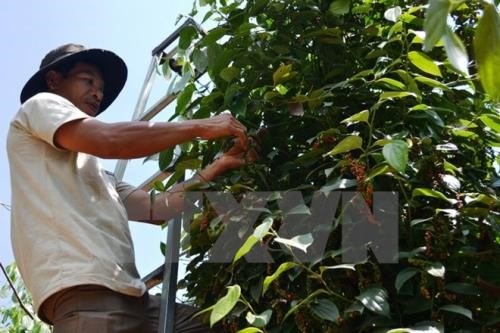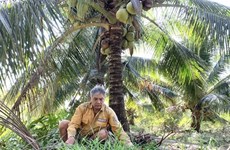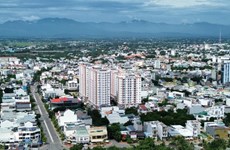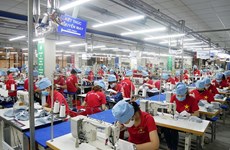Pepper industry prioritises quality
The pepper industry plans to reduce the area under the spice and focus instead on improving quality to ensure long-term growth, a seminar heard in Ho Chi Minh City on January 25.
 A farmer harvests pepper. The pepper industry plans to reduce the area where the spice is cultivated and focus instead on improving quality to ensure long-term growth. (Photo: VNA)
A farmer harvests pepper. The pepper industry plans to reduce the area where the spice is cultivated and focus instead on improving quality to ensure long-term growth. (Photo: VNA)HCM City (VNA) - The pepper industry plans to reduce the area
under the spice and focus instead on improving quality to ensure long-term
growth, a seminar heard in Ho Chi Minh City on January 25.
Le Van Duc, Deputy Director of the Crop Production
Department, said the pepper cultivation area had increased sharply since 2010
to 152,668ha last year, exceeding the Government’s zoning plans by more than
100,000ha.
High pepper prices in recent years have incentivised
farmers into expanding - even to unsuitable lands and without any planning - while the overuse of fertilisers has caused plants to degenerate quickly and be
more vulnerable to disease, he said.
According to research by international organisations,
global pepper supply has surpassed demand since supply went up by 5.5 percent
annually in 2012-17, while demand rose by only 2.4 percent.
The situation is forecast to continue until 2020, and
so pepper prices are unlikely to increase any time soon, he said.
Vietnam is the world’s largest pepper producer and
exporter.
In the domestic market, prices have gone down to
around 60,000 VND per kilogramme, about a third of the price a year ago, causing
difficulties for farmers, he said.
The sector should gradually reduce the area under the
crop to around 110,000ha in 2025 and 100,000ha in 2030, he said.
Nguyen Nam Hai, Chairman of the Vietnam Pepper
Association (VPA), agreed with Duc, saying relevant agencies should “advise farmers
not to expand the area under pepper from this year.”
Localities also need to persuade farmers growing
pepper without proper planning to “switch to other crops,” he said.
With import markets like the US and EU setting the bar
higher for food safety, the VPA and delegates at the meeting called on farmers,
processors and distributors to focus more on safety and hygiene.
They also called for speeding up the process of
sustainable production to improve quality and protect the environment.
Delegates suggested that the Ministry of
Agriculture and Rural Development should quickly review the list of
pesticides and ban the use of chemicals that foreign markets have banned.
Besides, exporters should develop close links with
farmers to better control quality, they said.
Vietnam exported 215 tonnes of pepper last year worth 1.19 billion USD, a 20 percent increase in volume but a 22 per cent decline in
value, Hai said.
They went to more than 100 countries and territories,
with Asia, Europe and the US being the biggest markets.
According to international research organisations,
global demand is expected to reach 570,000 -591,000 tonnes by 2025 compared to
the current 510,000 tonnes.
Vietnam would still be the world’s largest exporter,
so it is necessary to soon establish a trading floor for pepper to increase
transparency and hedge price risks for farmers, Hai said.
Minister of Agriculture and Rural Development Nguyen
Xuan Cuong said the rapid development of the pepper sector has exposed
shortcomings and “[it] needs to be restructured.”
He agreed not to increase the area under cultivation
and urged localities to enhance communication with farmers so that they can
switch to other crops where required and do not to expand cultivation of the
spice.–VNA













